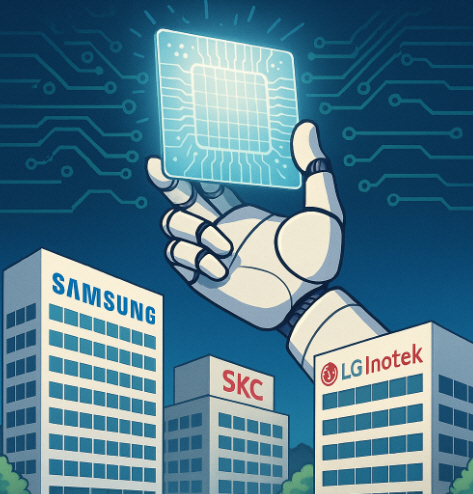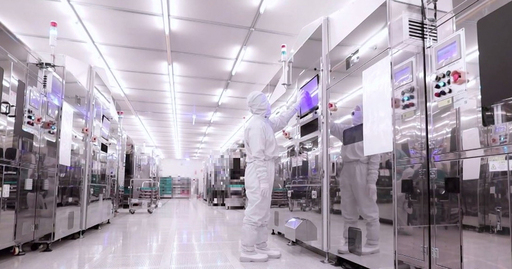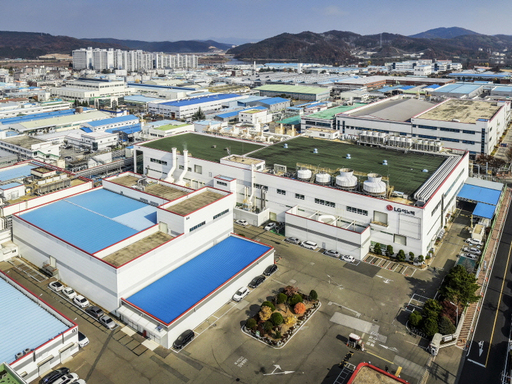


As the demand for artificial intelligence (AI) semiconductors surges, glass substrates, which have emerged as a key material for next-generation semiconductors, are now being increasingly adopted. Following Samsung and SK, LG has also joined the competition for technological leadership in this area, sparking a race among the three major domestic companies.
According to industry sources on the 9th, glass substrates replace the organic substrates, typically made of plastic, on which semiconductor chips are mounted. Glass is heat-resistant and has a smooth surface, making it less prone to deformation even at high temperatures, which is advantageous for implementing fine circuits. In fact, using glass substrates can increase data processing speed while reducing power consumption, earning it the title of the "dream substrate."
The global semiconductor industry is also showing intense interest. Global semiconductor companies like Intel, Nvidia, and AMD are revealing plans to adopt glass substrates in their next-generation products. In fact, Intel has announced plans to release commercial products with glass substrates by 2030. Market research firm Insight Partners stated, "The glass substrate market is expected to grow from approximately $23 million (about 31.6 billion won) this year to $4.2 billion (about 5.7 trillion won) by 2034," adding, "The market's potential has already been confirmed, and profitability is guaranteed."

In South Korea, Samsung Electro-Mechanics is taking the fastest steps. The company has established a pilot production line for glass substrates at its Sejong plant and plans to begin prototype production as early as the second quarter. Jang Deok-hyun, President of Samsung Electro-Mechanics, stated at CES 2025 in January, "We plan to promote semiconductor glass substrate samples (prototypes) this year." Samsung Electro-Mechanics is also preparing for mass production in partnership with glass substrate manufacturing companies such as Corning, YMT, and Inometry.
SK, through its subsidiary SKC, completed a glass substrate production plant in Georgia, USA, last year. SKC's subsidiary, Apsolix, is a joint venture with global semiconductor equipment company Applied Materials (AMAT). They are currently producing prototypes and conducting customer evaluations, aiming to accelerate technology development with a target for commercialization in 2026.

Latecomer LG Innotek has also recently declared its full-scale entry into the market. The company has started ordering key process equipment to establish a glass substrate pilot production line at its Gumi plant in North Gyeongsang Province. Last month, LG Innotek signed a 6 trillion won investment agreement with the city of Gumi to strengthen its glass substrate development and production base. Through this, the Gumi plant is planned to become the next-generation production hub for FC-BGA substrates and glass substrates.
Industry experts analyze that the leader in the "early glass substrate market" will determine the future dominance of the semiconductor packaging industry. Lee Chang-min, a researcher at KB Securities, stated, "With the expansion of AI, data processing volumes will increase exponentially, and by 2030, it will be difficult for existing substrates to keep up," forecasting an increase in demand for glass substrates.
ChatGPT를 사용하여 번역한 기사입니다.


 Copyright ⓒ 메트로신문 & metroseoul.co.kr
Copyright ⓒ 메트로신문 & metroseoul.co.kr
Copyright ⓒ Metro. All rights reserved. (주)메트로미디어의 모든 기사 또는 컨텐츠에 대한 무단 전재ㆍ복사ㆍ배포를 금합니다.
주식회사 메트로미디어 · 서울특별시 종로구 자하문로17길 18 ㅣ Tel : 02. 721. 9800 / Fax : 02. 730. 2882
문의메일 : webmaster@metroseoul.co.kr ㅣ 대표이사 · 발행인 · 편집인 : 이장규 ㅣ 신문사업 등록번호 : 서울, 가00206
인터넷신문 등록번호 : 서울, 아02546 ㅣ 등록일 : 2013년 3월 20일 ㅣ 제호 : 메트로신문
사업자등록번호 : 242-88-00131 ISSN : 2635-9219 ㅣ 청소년 보호책임자 및 고충처리인 : 안대성